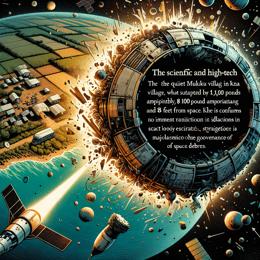Image created by AI
NASA Funds Essential Research on Space Sustainability and Orbital Debris Mitigation
NASA's Office of Technology, Policy, and Strategy (OTPS) has recently affirmed its dedication to a future of responsible universe exploration by sponsoring a series of research proposals from universities, which are aimed at analyzing the intricate network of economic, social, and policy concerns associated with the sustainability of Earth’s orbit and cislunar areas. This initiative epitomizes NASA's Space Sustainability Strategy, underlining an enduring pledge to safe, peaceful, and responsible extraterrestrial explorations intended for the enrichment of future explorers.
With an allocation of approximately $550,000, NASA will fund five research projects that deeply delve into imminent challenges fronting space sustainability. Dividing the focus, three of these grants will concentrate on the escalating threat posed by orbital debris – defunct human-made objects cluttering Earth's orbit. This orbital litter presents a tangible risk of collision to operational spacecraft, posing a blockade to the continued viability of low-Earth orbit ventures and potentially thwarting the flourishing of a space-based economy.
The issue of orbital debris is two-fold; not only does it spell peril for current space assets, but it also jeopardizes the sanctity of access to space for the coming generations. The dedicated funding from NASA aims to catalyze the development of strategies and technology to mitigate these risks, ensuring that the envelope of Earth remains a safe and viable frontier for continued exploration and exploitation.
In tandem with the focus on orbital debris, the other two research awards hinge upon the subject of lunar surface sustainability. These studies are purposed to wrestle with the cogent policy conundrums circling the conservation of significant lunar sites, which are of historical, scientific, or economic value. Additional complexities such as technical requirements, economic implications, and cultural aspects will also be grappled with in the scope of mission planning and execution.
Ellen Gertsen, representing the OTPS at the NASA Headquarters, emphasized the significance of sustainable space utilization for current and subsequently forthcoming episodes of space exploration. She outlined the imperative of charting the murky waters of orbital debris negotiations and sculpting a blueprint for the continued availability of the lunar surface for subsequent explorers.
NASA has trusted a team of resident experts to cherry-pick these proposals, a testament to the agency's judicious and future-facing stewardship of outer space endeavors. This financial and intellectual commitment represents an acknowledgment of the complex interdependencies between space activities and the broader tapestry of human and economic development.
The organization has thus demonstrated its resolve to spearhead a veritable consciousness in space exploration, one that advocates for a legacy beyond the immediate returns of scientific discovery and technological freedom. These studies, bolstered by NASA's strategic sponsorship, will contribute vital knowledge and tools necessary for making well-rounded, informed policy decisions that will protect the sanctity of space as a shared and durable resource.










